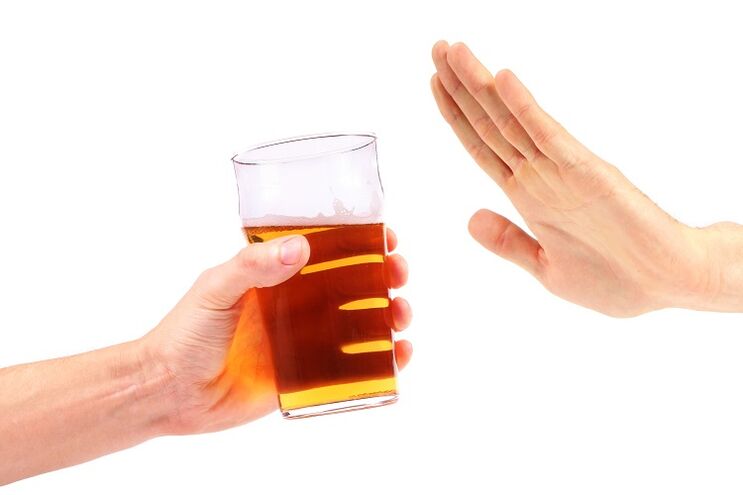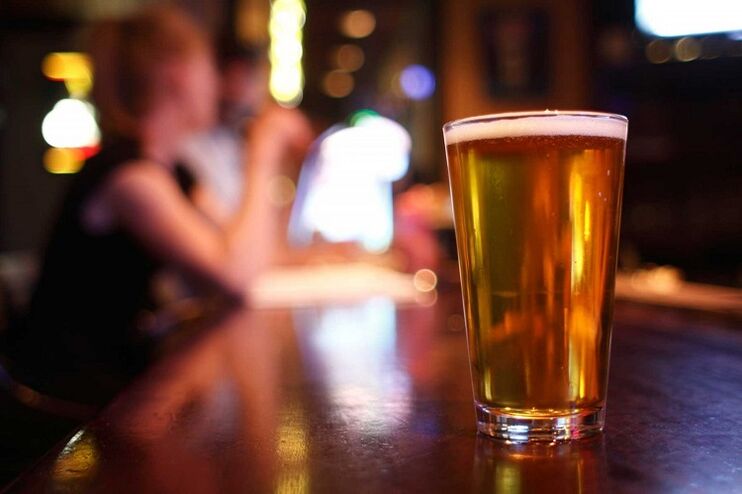At the end of a hard day's work, you want to relax with a glass of wine or a can of beer. Looks like what will happen if you drink alcohol every day "for fun"?
The so-called "evening alcoholism" does not provoke open public disapproval. At first glance, nothing bad happens: there is no syndrome of immediate withdrawal from a glass of vodka. But frequent use of alcohol affects the human body, regardless of the "elite" of drinks. Young, successful people in their 25s and 40s buying expensive cognac don't even notice the last link in the alcohol chain standing in line with them - an unshaven, tired man in crumpled clothes. However, if a person drinks alcohol every day, he will soon have to pay not only with money, but also with health, family ties and social status.
The insidiousness of ethyl alcohol
The amount of alcohol consumed in terms of pure alcohol should not be more than 5 ml / day (women) and 10 ml / day (men). It is best to divide it into several tricks. That is, 25 ml of strong drink, 100 ml of wine, 250 ml of 3-4% beer, the exam at the festive table, will not bring destructive harm to the female body (for men the amount is doubled). The frequency of use of even such "harmless" doses makes them dangerous.
The destruction of the body begins gradually. It depends directly on age, health, weight, hereditary predisposition. If these factors do not match, the first stage of alcoholism can occur after six months or a year. And a person who abuses alcohol will spend the rest of his life on alcohol.

Mental changes
As daily alcohol consumption is aimed at rapidly achieving a psychotropic effect ("relaxation"), psychological dependence occurs first. After a week, a person becomes accustomed to relieving stress in this way, without a sobering break, and after a year forgets that he canis different.
The main symptoms of what is happening in the body:
- Insomnia. Despite the strong hypnotic effect of ethanol, the phases of healthy sleep are disrupted under its influence. Sleep becomes either deeply narcotic or, conversely, short, restless. Subsequently, one has to drink alcohol just to fall asleep.
- Nervousness and irritability. The constant presence of alcohol in the blood causes oxygen starvation of the brain. Along with sleep disorders, this leads to fatigue, which provokes earlier drinking. Thus a "vicious circle" is formed.
- Lowering the criticality threshold. One begins to react sharply to comments ("Yes, I drink constantly, but what's so scary about that? "), Constantly finding new reasons to drink.
- Look for a reason. Gradually, the holidays and small doses are replaced by copious drinks on the TV every night. The patient is ready to blame the whole world for having an official reason to take another dose.
- Increasing aggression. The majority of domestic crimes occur in the first and second stages of alcoholism. Imaginary courage makes you look for adventure, the case often ends in battles.
Physiological changes
The consequences of long-term alcohol consumption are irreversible disorders in the body.
- Change in the composition of the blood. Literally a few hours later, glucose levels drop, blood clots increase and blood circulation deteriorates.
- Avitaminosis. Against the background of general intoxication, the lack of vitamins seems to be a small problem. However, gradually this leads to hair loss, destruction of tooth tissue, indigestion and reduced immunity. Perhaps the development of anemia, early dementia, acute clinical depression.
- Effect of aging. The classic signs of an alcoholic are swelling of the face, vascular "stars" on the cheeks, pale or purple-cyanotic skin. The person looks 10-15 years older than the passport age. The appearance of women is changing especially fast.
- Destruction of nerve cells and tissues of internal organs. Absorbed through the esophagus, ethanol with bloodspreads to every cell of the body, gradually affecting the liver, kidneys, stomach, brain.
Big belly and thin legs - all the "charms" of beer alcoholism
Beer is one of the most insidious drinks. The stores offer a wide selection of a wide variety of varieties, the ads insist on "cooling off". Initially, low psychological alertness, which is caused by strong alcohol, leads to an increase in household alcoholism in beer.
Unlike vodka, beer has a lower calorie content, is easier to tolerate and has a mild hangover syndrome. However, if you drink it daily, the effects will be the same.
The elements that beer contains affect the production of hormones. In men with beer addiction, breasts grow, fat is deposited on the stomach and sides, the timbre of the voice becomes higher, impotence develops. If a woman drinks a lot of beer, she acquires masculine features: her voice becomes rough, the antennae begin to grow above the upper lip, the figure becomes stocky, masculine.
Beer alcoholism gradually destroys the hormonal system. Infertility, thyroid tumors, diseased pancreas - this is just a small list of problems from the abuse of soft drinks.
But beer has the most harmful effect on the heart. In people who periodically drink up to 3-5 liters of beer a day, the volume of the heart muscle increases several times. The so-called "bovine heart" effect, which doctors call cardiomegaly, appears. Muscle tissue gradually degenerates, shortness of breath occurs, and the heart rhythm is disturbed. In the future, the "bull's heart" threatens with serious complications.

It is important to remember that small doses of ethanol in beer lead to the formation of alcohol dependence. But it is much harder to trace.
Is the truth in the wine?
Speaking of the relative usefulness of wine, doctors mean drinks that are products of fermentation of grapes, with a strength of not more than 13%. A glass of dry wine a week will not cause any noticeable harm.
However, excessive passion for them has the same sad consequences that occur when drinking alcohol. Wine causes destruction of the limbic system of the brain, which is responsible for memories and emotions. Wine abuse leads to memory loss, dementia, premature dementia and impaired consciousness.
Red wine is contraindicated in migraine, high blood pressure, diabetes, gastritis. White wine has a negative effect on the pancreas and nerve cells in the brain.
Dessert wines are high in calories, the combination of sugar and preservatives exacerbates the negative properties of ethanol.
Champagne wines, due to their saturation with carbon dioxide, accelerate the absorption of alcohol into the blood. How much can a person drink at a festive table so as not to drink champagne? Literally a glass. In addition, the individual reaction can be unpredictable.
Alcohol and chemistry
Can I drink low-alcohol drinks while taking medication? The medical answer will be a resounding no!
Even "harmless" antipyretics such as aspirin and paracetamol, in combination with ethanol exposure, can cause sudden gastric bleeding or anaphylactic shock.
During treatment, it is worth giving up even small doses of alcohol in the evening. Ethanol increases the resistance of pathogenic bacteria to antibiotics, increases the side effects of many drugs. In addition, the disease itself is a contraindication.
You do not need to find out experimentally what will happen if you drink alcohol with medication. There is a high probability of complications to fatal.
Environmental note
It is worth worrying if:
- your loved one drinks more alcohol every day (including soft drinks);
- became irritable, nervous;
- he has symptoms of intoxication (hangover syndrome);
- complains of depression, insomnia, nightmares;
- no holiday in the house passes without alcohol.
When the first symptoms appear, it is important to convey to the person the need for treatment. However, you cannot talk to an alcoholic when he is under the influence of intoxicants or has a hangover. Choose a convenient moment, do not insist, speak calmly, quietly. Seek professional help if necessary.
Remember: if one of the spouses drinks alcohol, there is a danger that the other spouse will become addicted.
























